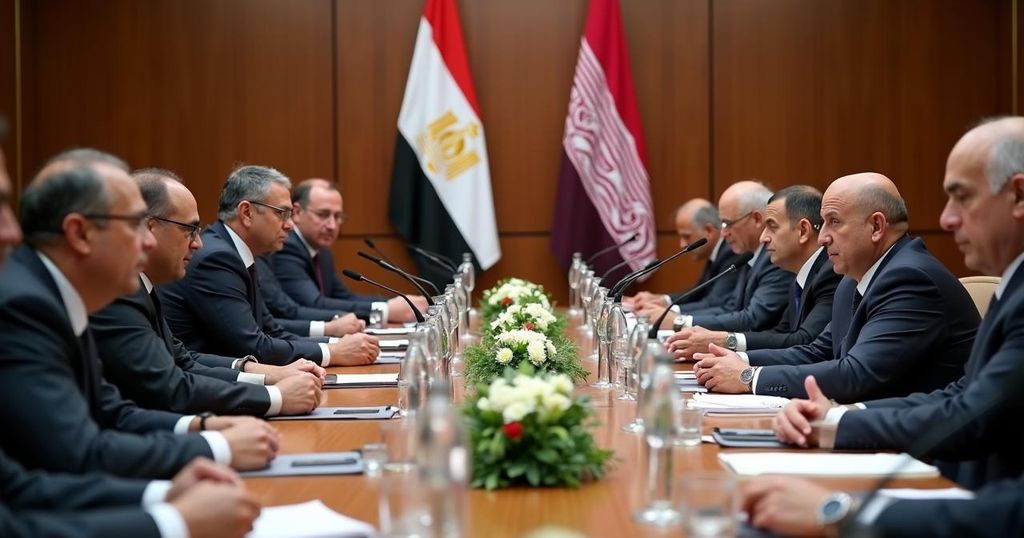Egypt’s Foreign Minister Engages in High-Level Talks on Crisis in Lebanon and Gaza

Egypt’s Foreign Minister Badr Abdelatty held a phone call with Qatar’s Prime Minister and Foreign Minister to discuss the urgent need for a ceasefire in Gaza and address the escalating violence in Lebanon. The discussions emphasized humanitarian aid delivery, the importance of empowering Lebanese institutions, and adherence to UN Security Council Resolution 1701. Abdelatty also expressed concerns over the humanitarian crisis in Lebanon and Gaza, advocating for immediate international response and support.
On Saturday, Egypt’s Foreign Minister Badr Abdelatty engaged in a telephone discussion with Qatar’s Prime Minister and Foreign Minister, Mohammed bin Abdulrahman Al Thani, focusing on the unfolding situations in both Lebanon and Gaza. The dialogue primarily revolved around ongoing endeavors to secure a ceasefire in Gaza, facilitate the release of hostages, and ensure the unobstructed delivery of humanitarian assistance to the beleaguered region. Moreover, Abdelatty underscored Egypt’s commitment to fostering Palestinian unity by hosting delegations from Fatah and Hamas in Cairo. In an earlier conversation with France’s Foreign Minister, Jean-Yves Le Drian, Abdelatty addressed concerns regarding both Lebanon and Gaza. According to a statement from Egypt’s Foreign Ministry spokesperson, Ambassador Tamim Khallaf, Abdelatty articulated pressing concerns over the escalating violence in Lebanon, particularly following an incident wherein the Israeli military targeted United Nations Interim Force in Lebanon (UNIFIL) positions, resulting in injuries to two UN personnel. He emphasized the imperative for the Israeli army to guarantee the safety of UN personnel and property. Abdelatty ardently called for an immediate ceasefire and de-escalation of tensions within the region, reaffirming Egypt’s persistent efforts to prevent further conflict escalation. He reiterated Egypt’s stance in rejecting any violations of Lebanese sovereignty and territorial integrity, while also highlighting the importance of strengthening Lebanese institutions, particularly the Lebanese army. Furthermore, he stressed the necessity for all involved parties to fully adhere to United Nations Security Council Resolution 1701. During their discussions, the ministers confronted the deteriorating humanitarian situation in Lebanon amid continuous Israeli aggression. They collectively underscored the necessity of a ceasefire, the empowerment of Lebanese institutions, and the full execution of UN Resolution 1701. This resolution supports the deployment of the Lebanese army in southern Lebanon and calls for the election of a president through national consensus. The ministers also emphasized the urgency of international initiatives to provide vital humanitarian, medical, and shelter assistance to the Lebanese populace, who are confronting an acute humanitarian crisis exacerbated by the displacement of over 1.2 million individuals. In conclusion, Abdelatty exhibited profound concern regarding the humanitarian challenges in Lebanon and stressed the imperative for swift humanitarian aid to assist the Lebanese government in addressing the critical situation. He further advocated for a ceasefire in Gaza, full access to humanitarian relief for the region, and an immediate cessation of Israeli military actions in the West Bank, while acknowledging France’s endorsement of Palestinian rights and the establishment of an independent Palestinian state in accordance with the two-state solution framework.
The dialogue between Egypt and Qatar’s foreign ministers reflects the complex geopolitical dynamics shaping the Middle East, particularly the current crises in Lebanon and Gaza. Both nations are engaged in ongoing discussions aimed at mitigating violence and addressing humanitarian needs resulting from prolonged conflicts. Egypt’s pivotal role in mediating Palestinian reconciliation and advocating for regional stability underscores its influential position in Middle Eastern affairs. The situation in Lebanon remains precarious, with escalations in violence directly impacting the sovereignty and humanitarian situation in the region, necessitating urgent international attention and response.
The discussions between Egypt and Qatar highlight a concerted effort to address the escalating crises in Lebanon and Gaza. Minister Abdelatty’s emphasis on ceasefires, humanitarian aid, and the adherence to international resolutions underscores the urgent need for cooperation among regional actors. The dialogue also illustrates the broader implications of regional stability on humanitarian conditions, marking a critical moment for international intervention and support.
Original Source: www.dailynewsegypt.com








